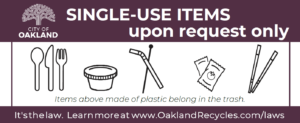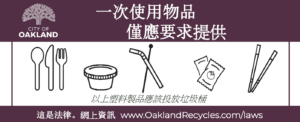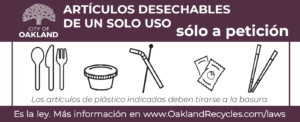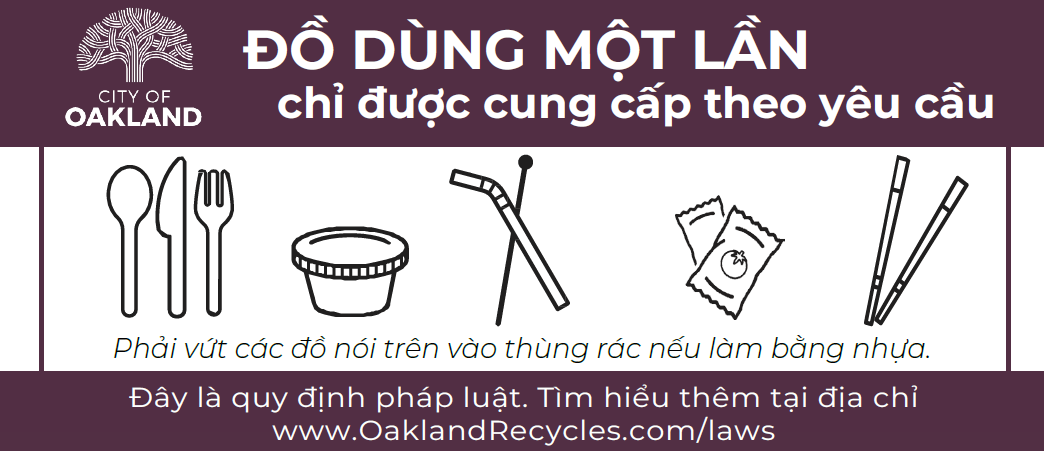Laws & Rules
What every business and residence needs to know about city, county and state laws and regulations.

Mandatory Weekly Recycle, Compost, and Trash Removal
Oakland Municipal Code Chapter 8.28 mandates all businesses, multifamily properties and single family homes subscribe to weekly recycle, compost, and trash collection that matches waste generation levels.
- All recycle, compost and trash discards must be stored in a watertight container(s) of sufficient size and capacity to hold all material between weekly service.
- It is unlawful for any person to put waste from their business or home in, on top of, or alongside the street litter containers placed in the sidewalk area. Street litter containers are for use by pedestrians depositing small waste carried by them (OMC 8.29.160).
- It is unlawful for any person to illegally dump or improperly dispose of waste matter (OMC 8.11.310). City, County, and State law mandate waste is sorted properly into recycle, compost, and trash containers.
These codes and laws exist to minimize litter and maximize the use of natural resources and reduce methane emissions that occur when organic material like paper, food scraps, and plant debris are buried in a landfill.
State and Local Recycling and Composting Laws
State law SB 1383 requires everyone in California to recycle and keep organic waste like food, plant debris, and soiled paper out of the landfill. The City of Oakland’s 2030 Equitable Climate Action Plan establishes composting and increasing the recovery of edible food as key strategies to minimize the acceleration of climate change.
Alameda County Waste Management Authority (StopWaste) leads enforcement of SB 1383 and their Organics Recovery and Recycling Ordinance (ORRO). Information on ORRO requirements are found here along with resources to help you comply.
Basic ORRO compliance requirements for businesses/multifamily properties:
Your site must:
- Subscribe to curbside compost and recycle collection service in addition to trash.
- Place color-coded and labeled compost and recycle containers next to all indoor trash containers (excludes restrooms).
- Sort materials into the proper carts/bins. Learn what-goes-where.
- Educate employees, contractors, tenants, and students about the law at least annually.
- Periodically inspect bins and provide feedback to employees and contractors about incorrectly placed items.
- Commercial property managers: Inform tenants no later than 14 days after move-in and at least 14 days prior to move-out about the rules.
- Some businesses that generate surplus edible food—such as grocery stores, food distributors, large restaurants, and large events and venues—must have a written agreement with a food recovery organization or service to donate edible surplus food to feed people.
Tools to Help You:
- Contact WMAC to set up trash and compost collection and use our list to select your recycle service provider.
- Watch a short how to video on setting up compost and recycle containers in your business and use the indoor bin setup guide.
- Request free indoor green compost containers here.
- Request free indoor bin stickers here, and request wall signage or cart/bin decals at recycling@oaklandca.gov.
- Share this training video at least annually or when on-boarding new staff.
Learn more about edible food recovery requirements and find tools to help with compliance if this requirement applies to your business.
Edible Food Recovery
Donating edible food helps people and our planet!
Under state law SB 1383 and Oakland Municipal Code Chapters 8.28.144 and 8.28.145, certain food businesses in Oakland are required to keep surplus edible food out of their compost and trash bins and instead recover the surplus food to feed people.
This way, surplus edible food is used to nourish people in our communities instead of being sent to a compost facility or a landfill where harmful greenhouse gases (methane) are generated.
Businesses are protected under law from liability and may see cost savings from reduced compost collection service costs and enhanced tax deductions – more on this below.
Which Oakland businesses need to comply with the food recovery law?
The following businesses must recover surplus edible food to feed people. Compliance dates depend on the type and size of business.
All Oakland businesses with surplus edible food are encouraged to donate excess food even if it is not required.
January 1, 2022 – Tier 1 sites:
- Grocery stores (10,000+ sq. ft.)
- Large supermarkets ($2M+ gross annual sales)
- Food service providers
- Food distributors
- Wholesale food vendors
January 1, 2024 – Tier 2 sites:
- Restaurants (5,000+ sq. ft. or 250+ seats)
- Large health care facilities (100+ beds)
- Large hotels (200+ rooms)
- Large venues & special events (2,000+ people/day)
- State agency facilities (5,000+ sq. ft. or 250+ seats)
- Public schools
1. Save the maximum amount of surplus edible food that would otherwise be composted and donate it to food recovery organization(s), food recovery service provider(s), and/or staff. Businesses may also sell surplus food at a discounted price and/or repurpose surplus food.
Note: Any inedible food, food scraps, and prep trimmings must be composted.
2. Have a written agreement with a food recovery organization or service provider to donate surplus edible food to feed people, if applicable.
Find a food recovery organization or service provider to partner with by visiting: https://resource.stopwaste.org/food-recovery-organizations
3. For all of the compliance methods under item 1, maintain monthly records of type, frequency, and pounds of food donated.
Check out StopWaste’s printable food donation forms to maintain monthly records of types of food donated, frequency of donations, and total pounds of food donated to food recovery organizations or service providers, and/or distributed directly to staff or other individuals.
How are the food-recovery rules enforced?
Surplus food donation inspections are being conducted unannounced by the Alameda County Department of Environmental Health or by a partnering enforcement agency effective January 1, 2024. During an inspection you will be asked to show a copy of your written agreement(s) with food recovery organizations or services and your monthly records of food donations.
Citations and fines up to $500 are being issued by StopWaste for non-compliance.
How are fines assessed?
If a site fails to comply with the edible food donation requirements, a warning (Notice of Violation) will be issued. If the site still fails to comply 60 days after the warning was issued, a fine will be assessed for each requirement that is violated. Fine amounts are assessed at two levels, depending on the food generator type (Tier 1 or Tier 2 generator) and will increase with subsequent violations. Fine amounts do not reset.
Violations
(Each violation constitutes its own fine)
• Lack of written agreement with Food Recovery Organization or Food Recovery Service (FRO/FRS)
• Lack of food donation records
• Failure to recover maximum amount of edible food
Fine Levels for Tier 1 sites:
1st citation – $100
2nd citation – $200
3rd and subsequent citations – $500
Fine Levels for Tier 2 sites:
1st citation – $50
2nd citation – $100
3rd and subsequent citations – $250
Pay citations
Citations can be paid by visiting this StopWaste site: https://www.stopwaste.org/rules/enforcement-and-violations/citations
Legal Protections for Food-Donating Businesses
Primary legal protection for food donors include:
· Federal Bill Emerson Good Samaritan Food Donation Act
· California Good Samaritan Food Donation Act (AB 1219)
All donors are protected from criminal and civil liability when food such as shelf-stable items, prepared foods, produce, beverages, and other food items are donated in good faith, using safe food handling procedures, to an individual, nonprofit, or charitable organization.
Enhanced Tax Deductions for Food-Donating Businesses
While businesses can claim tax deductions on food losses, deductions are higher when surplus edible food is donated for human consumption. For details, consult IRS Publication 526 at: www.irs.gov/forms-pubs/about-publication-526.
RESOURCES
Summary Flyer
View or download this two-page summary flyer that covers edible food recovery rules for Oakland businesses and safe food handling procedures for donating foods.
Food Recovery Record Tracking Tools
Check out StopWaste’s printable food donation forms to maintain monthly records of types of food donated, frequency of donations, and total pounds of food donated to food recovery organizations or service providers, and/or distributed directly to staff or other individuals.
Food Recovery Organizations and Service Providers
Find a food recovery organization or service provider to partner with by visiting:
https://resource.stopwaste.org/food-recovery-organizations
Industry-Specific Guidance to Safely Recover Food
Check out these industry-specific guidance documents from StopWaste on how to setup an edible food recovery program.
https://www.stopwaste.org/resource/industry-specific-guidance-to-safely-recover-food
Donation Guide from Alameda County Community Food Bank (ACCFB)
Guidance documents from the ACCFB regarding canned food safety and sell-by/use-by dates.
https://www.stopwaste.org/resource/donation-guidance-from-the-alameda-county-community-food-bank
Request Help from StopWaste
StopWaste representatives provide free phone, email, virtual, and in-person support to help set up a system to recover and donate surplus edible food.
Use this link to request help from StopWaste.
Request Help from the City
Have a question about food recovery rules in Oakland? Reach out to the City of Oakland’s Recycling Hotline at recycling@oaklandca.gov.
CalRecycle
CalRecycle, a state agency, has information and resources for food recovery donors here: https://calrecycle.ca.gov/organics/slcp/foodrecovery/donors/
Careit App
Check out the free Careit app! The app allows businesses to post a donation for pick up or drop off. Nonprofits then reserve and rescue donations to feed nearby communities. Careit auto-generates a liability waiver agreement.
Learn more here: https://careit.com/donors/
Reusable Foodware Ordinance
ATTENTION Oakland Food Vendors
To help reduce litter and plastics in our environment, the City of Oakland (City) adopted a Reusable Foodware Ordinance (Ordinance) in December 2023.
The Ordinance aims to:
- Reduce the amount of plastic pollution in our environment,
- Prioritize the use of reusable foodware over single-use disposable foodware, and
- Ensure single-use foodware is free of harmful chemicals.
FREQUENTLY ASKED QUESTIONS
Who has to follow the Reusable Foodware Ordinance?
Oakland food vendors selling prepared food — including restaurants, cafes, bars, delis, fast-food establishments, caterers, food trucks, and event food booths. City facilities must also follow these requirements.
The rules do not apply to hospitals, public agencies, public and private schools, senior centers, prisons, or jails.
When does the Reusable Foodware Ordinance take effect?
Some requirements went into effect in January 2024.
Other requirements start on July 1, 2025.
See the foodware requirements section below for effective dates.
What are single-use foodware and foodware accessories?
Single-use foodware and foodware accessories are designed to be used once then thrown away.
Single-use foodware includes to-go containers, cups, plates, utensils, clamshells, bowls, and condiment cups.

Single-use foodware accessories include utensils, straws, condiment packets, napkins, lids, and stirrers.

What are the Reusable Foodware Ordinance requirements?
There are a number of requirements – please scroll down.
EFFECTIVE JANUARY 2024:
1. SINGLE-USE FOODWARE ACCESSORIES UPON REQUEST ONLY
Single-use foodware accessories – including straws, utensils, napkins, lids, stirrers, and condiment packets – may be provided to customers upon customer request or at self-service stations only.

No bundling of utensils, napkins, and/or condiments allowed.
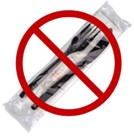
Rules apply to dine-in, to-go orders, and food-delivery apps.
These requirements are also state law AB 1276.
CONDIMENTS
For dine-in service, condiments must be provided in reusable containers or in bulk single-use containers.
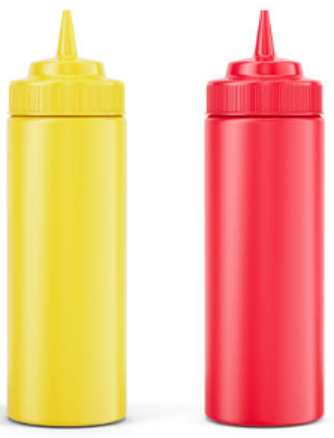
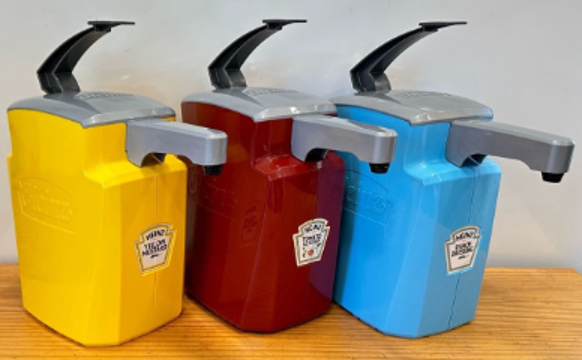
SIGNAGE
To help businesses notify their customers, the City has developed an Accessories Upon Request sign – available in English, Chinese, Spanish, and Vietnamese.
Click on images below to print and post or request a hardcopy by emailing recycling@oaklandca.gov
2. CUSTOMER-PROVIDED REUSABLES FOR TO-GO ORDERS
For to-go orders – food vendors are required to fill customer-provided reusable cups and containers (when requested by customers) so long as the customer’s reusables are clean and can hold orders safely.
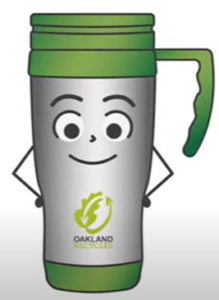
3. ACCEPTABLE SINGLE-USE DISPOSABLE FOODWARE
Single-use disposable foodware includes to-go containers, cups, plates, utensils, clamshells, bowls, and condiment cups.
For dine-in* and take-out orders – Oakland food vendors may only use single-use disposable foodware products that are:
- Not made of polystyrene foam (or “Styrofoam”),
- Not made of “compostable plastics”/bio-plastics (including PLA-lined cups), and
- Certified as free of High Priority Toxic Chemicals**
*Note that beginning July 1, 2025, food vendors are required to serve food on reusable foodware (e.g., glass cups, ceramic plates, and steel utensils) for dine-in service.
**High Priority Toxic Chemicals includes PFAS and those listed under California’s Prop 65. If fewer than three options by foodware product type (e.g., single-use cups) are available, this requirement does not apply for the specific foodware product type. Currently, no foodware product type has three certified vendor options, therefore a food vendor may use any single-use foodware item as long as it is NOT made of polystyrene foam or compostable plastic (including PLA-lined cups).
The City has a list of suggested single-use foodware that are free of harmful food packaging chemicals – available here. This list will be updated annually.
Polystyrene foodware is also prohibited statewide under SB54.

EFFECTIVE JULY 2025:
4. REUSABLE FOODWARE FOR DINE-IN SERVICE
Starting July 1, 2025, food vendors are required to serve food on reusable foodware (e.g., glass cups, ceramic plates, and steel utensils) for dine-in service.

For food trucks and event food booths – this requirement applies if your business provides tables and chairs for nearby dining. For example, if your business provides tables and chairs outside of your food truck or event food booth for customers to eat the food they have purchased from your business, then food must be served on reusable foodware (e.g., steel cups, steel utensils, and reusable plastic or ceramic plates).
For caterers – this requirement applies if the catering company serves food to customers at a business site occupied by the catering company. For example, if the catering company has customers come to their business site for tastings, then the food must be served on reusable foodware (e.g., steel cups, steel utensils, and reusable plastic or ceramic plates).
5. REUSABLE CUPS AT LARGE EVENTS AND VENUES
Beginning July 1, 2025, large event* and large venue** operators will be required to establish a reusable beverage cup system for non-packaged beverages like wine from a bottle, fountain soft drinks, or beer from a keg.
Compliance requirements will be phased in over time.
Beginning July 1, 2025, large event and large venue operators must demonstrate to the City that at least 25% of all non-packaged beverages are served from reusable cups.
By January 1, 2027, large event and large venue operators must demonstrate to the City that 100% of all non-packaged beverages are served from reusable cups.
Packaged beverages sold to customers, like canned wine, canned beer, and bottled soda, will remain allowable at large events and venues.
*Large events include any indoor or outdoor event within Oakland that is subject to a City permit and is expected to have more than 500 attendees or participants.
**Large venues mean permanent facilities that seat or serve an average of more than 2,000 individuals per day of operations over the calendar year. Large venues include arenas, performing art centers, theaters, and other public attraction facilities.
Learn more about Oakland event requirements here.
How is reusable defined?
Reusable foodware is defined as being able to be sterilized in a commercial washer at least 780 times (CCR 17989.3).
How are the Reusable Foodware Ordinance requirements enforced?
Patrons and inspectors report to the City when they see violations.
Businesses receive a Notice of Violation and may receive a fine of up to $500 for repeated violations.
Are waivers available for some or all of the Ordinance requirements?
Food vendors may request a full or partial waiver for:
- Acceptable Single-use Disposable Foodware requirements (Item 3 above) and/or
- Reusable Foodware for Dine-in Service requirements (Item 4 above).
The City is currently developing a waiver application. The waiver application will be available here – please check back for updates.
If you need help determining whether or not your business needs a waiver, or if you would like free assistance from a City representative on how to comply with Ordinance requirements, please contact the City’s Recycling Hotline at recycling@oaklandca.gov.
What is the problem with compostable plastics?
In recent years, consumer demand for more eco-friendly alternatives to
conventional plastic single-use disposable foodware has led to a surge in the use of compostable plastics, a type of biodegradable plastic designed to break down into organic matter under specific environmental conditions. Made from both renewable sources like sugar cane and corn as well as fossil fuels, compostable plastics are used to make things like disposable utensils, straws, food scrap bin liners, takeout food containers, and cups. However, increasing awareness and emerging research suggest that compostable plastics can pose human health and environmental risks as well as challenges to waste management programs.
The majority of composters in California along with Oakland’s compost collector, WM, are unable to process these compostable plastics into finished compost products. The reality that the compostable plastics do not provide the easy environmental solution they promised is disappointing. Due to the environmental and health concerns connected to compostable plastics, the City has banned the distribution of single-use disposables made from this material. Check out the Problem with “Compostable” Plastics flyer.
Reusables are the best option for human health and safety and for the environment.
RESOURCES
• Reusable Foodware Ordinance Summary flyer – English, Chinese, Spanish, Vietnamese
• Reusable Cup Refill Guidelines flyer
• Reusable Container Guidelines – English, Chinese, Spanish
• Accessories Upon Request signage (English, Chinese, Spanish, and Vietnamese)
Click on images below to print and post or request a hardcopy by emailing recycling@oaklandca.gov
• Problem with “Compostable” Plastics flyer
• City’s Single-Use Disposable Foodware Purchasing Guide
• Bags to Bins guidance flyer for businesses – describes container liner rules for trash, recycle, and compost
• City of Oakland Green Guide – Environmental Regulations and Resources for Oakland Food & Beverage Businesses (English, Chinese, and Spanish)
• Oakland Municipal Code (OMC) – Reusable Foodware Ordinance Council Report and updated OMC Chapter 8.07
• StopWaste grants to help businesses switch to reusables
• Concerned about dishwashing space? Check out StopWaste’s list of reusable foodware service providers
Report Illegal Dumping
Report illegally dumped debris, an active dumper, or ongoing improper use of a street litter receptacle to Environmental Enforcement Officers.
- Use SeeClickFix
- Call 510-615-5566
- Contact the Environmental Enforcement Unit with questions at 510-238-3700 or eeoinfo@oaklandca.gov
Report Illegal Dumping
- Use SeeClickFix
- Call 510-615-5566
- Contact the Environmental Enforcement Unit at 510-238-3700 or eeoinfo@oaklandca.gov

